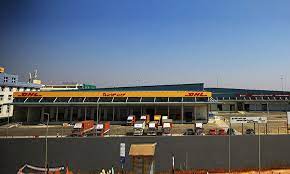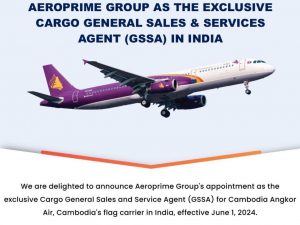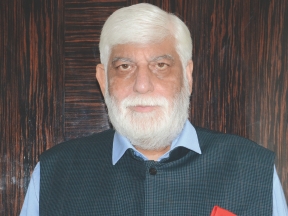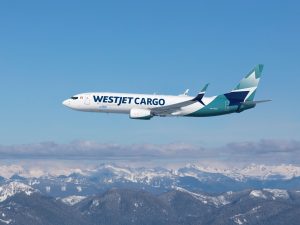Kempegowda International Airport Bengaluru (BLR Airport) promotes sustainability with the introduction of a new fleet of electric vehicle (EV) Airport Taxis, in collaboration with Refex eVeelz. The new EV fleet comprises 175 compact SUVs, marking a significant shift from traditional fuel-based taxis. With over 50 percent of the fleet being electric, BLR Airport aims to drastically reduce carbon emissions, contributing to a cleaner environment benefiting both the immediate surroundings of the airport and beyond.
Read More »Cargo revenues likely to dip to US$120 billion: IATA
At the Annual General Meeting (AGM) held in Dubai for the first time from June 2 to 4, 2024, IATA has announced cargo revenues are expected to fall to US$120 billion in 2024 (from US$138 billion in 2023). Both are down sharply from the extraordinary peak of US$210 billion in 2021, but it is above 2019 revenues, which were US$101 billion and an improvement on the previous forecast of US$111 billion (announced in December 2023). IATA strengthened profitability projections for airlines in 2024 compared with its June and December 2023 forecasts. It also stated total air cargo volumes are expected to reach 62 million tonnes (MT) in 2024. Despite the strength of demand, the cargo yields are expected to fall 17.5 per cent in 2024, while remaining slightly above 2019 levels. This is a normalisation after extraordinary COVID highs. A key factor in this is the significant belly capacity that entered the market in 2023 in tandem with the recovery of passenger travel. In general, air cargo is in a period of correction following an exceptional year in 2021. Yields, capacity growth, the belly-dedicated freighter split, and other key metrics are moving from the extraordinary mid-pandemic situation towards a continuation of pre-COVID trends and levels.
Read More »DIAL celebrates achieving 1MMT of cargo for the 2nd time in FY 2024
To celebrate and mark the achievement of handling 1 million metric ton of cargo for the second time in Financial Year 2024, Delhi International Airport Ltd (DIAL) organized ‘Samvaya 2.0’, an annual event for its stakeholders. Over 130 industry leaders joined the celebrations. “From a warm welcome by Zaheer Bakshi, Head Cargo, DIAL to insightful talks by Puskar Nath Thakur, CCO, DIAL and Sanjiv Edward, CEO, Cargo & Logistics, the event showcased our Future Ready vision and success,” said DIAL’s official LinkedIn Post. Munish Davessar presented the key initiatives and highlights of the year. “We were honoured to have Aditya Mishra, IPS, Chairman LPAI, as our chief guest. Special recognitions and rewards were given to stakeholders who contributed to achieving the milestones,” the post added.
Read More »Aeroprime Group appointed as cargo GSSA for Cambodia Angkor Air
Aeroprime Group, India’s leading new-age GSA, is proud to announce its appointment as the exclusive Cargo General Sales and Service Agent (GSSA) for Cambodia Angkor Air, the flag carrier of Cambodia, effective June 1, 2024. Currently, the airline boasts a fleet comprising A320, A321, and ATR aircrafts, serving over 11 destinations across Cambodia, China, Laos, Singapore, and Vietnam. Starting 16th June 2024, Cambodia Angkor Airlines will operate four (4x) weekly flights from Delhi (DEL) to Phnom Penh (PNH) utilizing A320 aircraft, offering the only direct connectivity between India and Cambodia which will help increase the trade between the countries and open up more business opportunities for cargo. With plans for further expansion across multiple Indian cities in the near future, Aeroprime Group will oversee the comprehensive sales service of the cargo space on these flights, ensuring efficient and seamless logistics solutions for the airline and expanding its network to meet the growing demand for reliable cargo solutions. Commenting on the announcement, Mr. Abhishek Goyal, Executive Director of Aeroprime Group, said, “At Aeroprime, we are keen to grow our business and maintain our market leadership position in the air cargo sector. This partnership with Cambodia Angkor Air is a significant step towards our strategic vision of offering a diverse and comprehensive product offering service to our partners and clients. We are committed to supporting Cambodia Angkor Air in their growth journey by aiding their expansion plans and enhancing sales within the Indian market.” This new appointment marks a significant milestone for Aeroprime Group, reinforcing its position as a leading Cargo GSSA in the Indian aviation industry. Further, it exemplifies Aeroprime’s dedication to providing top-tier sales and service solutions to global airlines, …
Read More »Mahindra Logistics enters JV with Japan firm to offer warehousing services
Mahindra Logistics announced setting up a joint venture with Japan’s Seino Holdings to offer warehousing and trucking services. In a filing to the stock exchanges, the company said that it has executed a joint venture agreement with Japan-based Seino Holdings Co. Ltd for warehousing and trucking services. The partnership aims to establish a joint venture company focused on providing warehousing and trucking services primarily to Japanese automobile companies and their affiliates in India, the company informed the stock exchanges. According to the filing, Mahindra Logistics will hold 50% ownership in the proposed JV entity, with the remaining 50% to be owned by Seino. “With Mahindra Logistics’ capabilities and strong network, Seino Holdings aims to provide optimised logistics solutions and broaden its reach to customers throughout India. The focus will be on leveraging technology, process innovation, operational excellence, and sustainability to drive growth and efficiency,” said Mahindra Logistics.
Read More »‘Ensuring data integrity across pharma supply chain is a challenge’
Cyrus Katgara, Partner, Jeena & Company says, “India’s airport infrastructure is experiencing a notable transformation, particularly in cargo handling, with a significant emphasis on pharmaceuticals. Ensuring data integrity across medical products and services throughout the supply chain is a significant challenge, alongside other areas in the sector that require improvement. While efforts are underway to address various issues, the shortage of skilled workforce remains a major pain point. Investments being directed towards upgrading facilities nationwide, including the construction of cold storage warehouses and specialized handling areas tailored to meet the stringent requirements of pharmaceuticals, demonstrate the progress in this domain. Despite these advancements, it’s important to recognize that India is still in the early stages of this evolution. While renowned for passenger travel, further investment and expertise are needed to fully leverage the potential of Indian airports for pharmaceutical and healthcare storage and distribution. Achieving comprehensive cold chain logistics for pharmaceuticals at all Indian airports will require time and continued efforts. With India’s airport infrastructure gradually adapting to meet the increasing demands of the pharmaceutical sector, the trajectory appears promising.
Read More »‘Collaborations, e-freight initiative, airport advancements to boost pharma growth’
Pradeep Panicker, CEO, GMR Hyderabad International Airport, says, “Collaborations among airlines, logistics firms, and the Indian government’s e-freight initiative, alongside airport advancements, has propelled the growth of pharma. Airports, prioritizing eco-friendly practices has integrated state-of-the-art cargo facilities. GMR Hyderabad Air Cargo (GHAC) distinguishes itself through investments in expanding infrastructure, notably the ‘Pharma Zone,’ positioning itself as a premier global hub for pharmaceutical logistics. The terminal, already equipped with a vast fleet of modern temperature-controlled containers, is poised to augment its temperature control area through expansion. GHAC is actively exploring advanced technologies such as robotic arms, conveyor systems, and Automated Storage and Retrieval Systems (ASRS) to bolster efficiency and mitigate labor costs over the next five years. Notably, GHAC holds certifications from the World Health Organization for Good Distribution Practices and accreditation under the IATA Safety Audit for Ground Operations Program (ISAGO).”
Read More »‘Cargo terminals must have adequate storage facilities for time-sensitive shipments’
Vipin Vohra, Chairman Continental Carriers says, “Indian airport terminals have been working to enhance their infrastructure and capacity to handle pharmaceuticals. Many pharmaceuticals are highly sensitive to temperature variations. Maintaining a requisite temperature throughout the transportation process, especially during air transit, is crucial to prevent degradation or loss of efficacy. Packaging and Labelling are vital to protect pharmaceutical products from damage and ensure their integrity during air transit. Inadequate packaging or labelling can lead to product spoilage, contamination, or loss. Some pharmaceutical products have a limited shelf life or require timely delivery to meet patient needs. Delays in air transportation can result in product expiration or stockouts, impacting patient care and causing financial losses for pharmaceutical companies. Addressing these pain points requires collaboration between pharmaceutical companies, logistics providers, and airlines, to implement robust quality management systems, advanced tracking technologies, and specialized packaging solutions tailored to the unique requirements of pharmaceutical transportation by air. With the increasing importance of the pharmaceutical industry, especially during the COVID-19 pandemic, airports in India have been focusing on improving their cold storage facilities and distribution networks for pharmaceutical products. Many airports in India, including major ones like Delhi, Mumbai, and Bengaluru etc, have dedicated pharma zones equipped with state-of-the-art cold storage facilities and temperature-controlled warehouses to handle sensitive pharmaceutical shipments. Overall, while there might still be room for improvement, Indian airport terminals have been making strides in enhancing their infrastructure and capacity to store and distribute pharmaceutical products.”
Read More »‘Robust infra, increased R&D budget, skilled labour vital to improve exports’
Soumya Sinha, Director, Supply Chain & Logistics, Middle East & South Asia, Frost & Sullivan shares, “Indian medical equipment export performance is lagging as compared to other nations because of the underdeveloped infrastructure, lack of skilled workers, and low investments in Research and Development which limits further innovation. Hence focus should be on developing robust infrastructure, increasing the R&D budget, and training human resources. The Drug formulations category accounts for approximately 72% of the total pharmaceutical exports. Unfortunately, exports of bulk drugs are getting less importance by domestic pharma companies as their main focus is on manufacturing drug formulations. Due to this India depends heavily on the imports of bulk drugs (APIs) and Personal Protective Equipment (PPEs) from other countries. This is a huge challenge as the prices of these imports are on the rise.
Read More »WestJet Cargo launches 3 new routes to ORD, YQM, ICN
As part of its expanded summer schedule, WestJet Cargo is launching three new destinations in a row: Chicago (ORD), Moncton (YQM), and Incheon (ICN). The Chicago route was opened for cargo sales on May 16th, connects Calgary to the US city three times a week, increasing to daily flights by June 17th and will continue to operate year-round. Operating with 737 aircraft, this route offers cargo capacities of 2,700 kg per flight, focusing on the transportation of perishables. This route addresses increasing demand and marks the opening of WestJet Cargo’s passenger belly network in addition to the weekly freighter that already operates into Chicago. Moncton, Canada, was opened for cargo sales on May 17th to meet the growing needs of the Canadian market and will continue to operate year-round. Also utilizing a 737 aircraft, this route links Moncton to Calgary, Edmonton, and Toronto with varying frequencies: up to daily flights to Calgary, 3 to 4 weekly flights to Edmonton, and 3 to 5 weekly flights to Toronto. The primary cargo for this route is live animals and can also accept 2,700 kg per flight of cargo. The Calgary to Incheon route, launched on May 18th, operates three days weekly with a 787 Dreamliner, offering a 60 tonnes capacity for all cargo commodities. This route is already highly popular with the WestJet cargo customers. “These new routes will significantly enhance our ability to serve the Canadian market by offering greater capacity and more options for our customers,” said Kirsten De Bruijn, Executive Vice President of WestJet Cargo. “We’re delighted to expand our network and provide reliable and efficient cargo services to meet the growing demand.”
Read More » Cargo Breaking News
Cargo Breaking News








